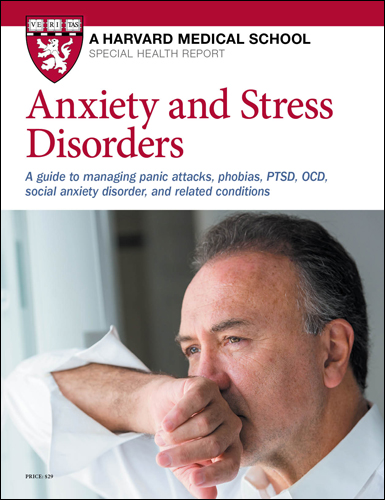When to worry about worrying

We all worry. Today, there seems to be no shortage of things to worry about. It's normal to feel anxious on occasion. In fact, temporary anxiety can be a healthy response to uncertainty and danger. But constant worry may be a sign of generalized anxiety disorder (GAD).
Do I have generalized anxiety disorder?
According to the National Institute of Mental Health, an estimated 5.7% of adults in the U.S. experience GAD . While other types of anxiety disorders arise from particular situations, generalized anxiety disorder is persistent and characterized by debilitating worry and agitation about everyday matters.
People with generalized anxiety disorder can't shake the feeling that something bad will happen and they will not be prepared. They may worry to excess about missing an appointment, losing a job, or having an accident. Some people even worry about worrying too much.
Symptoms of generalized anxiety disorder
- Persistent, excessive worry about several different things for at least six months
- Fatigue, difficulty sleeping, or restlessness
- Trouble concentrating
- Irritability
- Muscle tension
- Feeling tense or "on edge"
Only your doctor can determine whether you meet the criteria for generalized anxiety disorder. If you think you might have this condition, don't hesitate to talk to your primary care doctor. There are many different treatments that can ease the very real discomfort of this condition.
Physical symptoms are common too and can include a racing heart, dry mouth, upset stomach, muscle tension, sweating, trembling, and irritability. These bodily expressions of anxiety can have a negative effect on physical health. For example, people with generalized anxiety disorder are at greater risk for heart attack and other cardiovascular problems.
Treating anxiety
If you have generalized anxiety disorder, your doctor may discuss the following treatment options.
- Therapy. For some people, cognitive behavioral therapy (CBT) can help. CBT helps people recognize when they are misinterpreting events, exaggerating difficulties, or making unnecessarily pessimistic assumptions, and offers new ways to respond to anxiety-provoking situations.
- Medications. Commonly prescribed drugs include antidepressants, such as selective serotonin reuptake inhibitors (like Prozac or Zoloft), or dual serotonin and norepinephrine reuptake inhibitors (like Effexor or Cymbalta). These drugs take longer to work than the traditional anti-anxiety drugs, but also may provide greater symptom relief over time.
For more on diagnosing and treating anxiety and phobias, check out Coping with Anxiety and Stress Disorders, a Special Health Report from Harvard Medical School.
Image: SDI Productions/Getty Images
Disclaimer:
As a service to our readers, Harvard Health Publishing provides access to our library of archived content. Please note the date of last review or update on all articles.
No content on this site, regardless of date, should ever be used as a substitute for direct medical advice from your doctor or other qualified clinician.
















